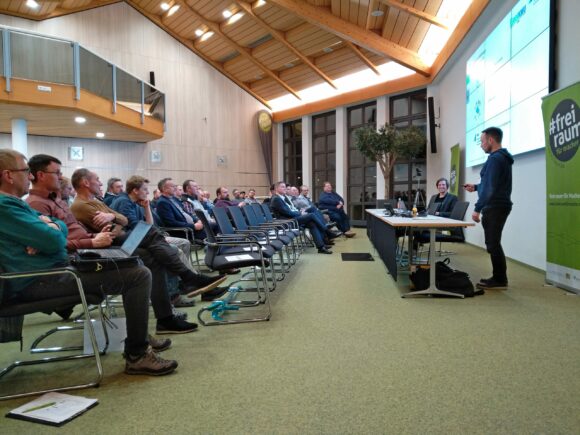In our loose series “Success made in Hof”, we are introducing Daniel Herrmann today. Born in Münchberg, he completed a dual Bachelor’s degree in Innovative Textiles in 2017, followed by a dual Master’s degree in Sustainable Textiles with programme directors Prof. Dr Anett Matthäi and Prof. Dr Michael Rauch. Today, the 25-year-old works as Sustainability Manager at Tenowo GmbH within HofTex Group AG, where he ensures compliance with the company’s statutory sustainability targets, among other things.

Mr Herrmann, what exactly are your tasks today?
“At the company, I am the project manager for the implementation of a circular waste and recyclables management system. We want to continuously improve our internal management systems with regard to greater sustainability. Among other things, we organise a lot of training courses and want to make our contribution to achieving defined sustainability targets that go beyond the legal requirements.”
Why did you decide to study at Hof University of Applied Sciences back then?
“My initial interest was of course favoured by my place of residence. However, it soon became clear that the university offered a very interesting range of science degree programmes. Because I wanted to earn my own money alongside my studies, the focus quickly shifted to a dual study programme. The experience gained from the combination of scientific theory and business practice is very valuable – and the many experiences, for example from laboratory internships, also helped me.”
Studying and training in parallel – some people shy away from this. Also because you have to work during the semester break, for example..
“To be honest, I do think that the dual study programme presents students with greater challenges than a normal degree course – and you should be aware of that. Holidays and free time are simply much more limited and the work, vocational school and study commitments can be very demanding. It is always possible that lectures at the university overlap with units at the vocational school, so that extra work may also be necessary. The exam phase of the degree programme can also overlap with the intermediate and final exams of the apprenticeship, so you have to coordinate a lot here. But:
In principle, anyone can successfully complete a dual study programme, there is nothing impossible about it. With a little motivation, determination and ambition, and with the support of the university and company, many things become much easier.”
Daniel Herrmann

How did you find the support – especially from the university?
“Of course, you benefit from a well-developed university structure and good communication. The study semesters were also designed with varied and really subject-specific subjects. In general, open questions and problems were always dealt with very quickly and the supervising professors were able to convey a great deal of expertise. It was also great that you could take part in various specialist events at discounted prices or even free of charge – such as the Hof Nonwovens Days or the ITMA 2019 in Barcelona. Only the commute between Hof and Münchberg for individual lectures was sometimes a little difficult to organise.”
What experiences did you ultimately gain from the dual study programme?
“The learning content of the degree programme and apprenticeship cover a broad spectrum and are sometimes linked – which quickly leads to a better understanding of subject-specific topics and enables good preparation for starting a career. For me personally, I noticed an increase in motivation and ambition as a result of the challenges of the dual study programme. The English-language semesters and the collaboration with international students were also of great benefit to me. The ability to work in a team with fellow students was also always at the centre of the programme. The only difficulties were the high failure rates in some subjects, as the high level of demand is clearly noticeable even in the basic subjects.”
How did you find the transition after graduation?
“I was able to establish contacts for the transition during the practical semester. The topic of my final thesis – it was about waste management – fortunately aroused great interest on the part of the management. And after a presentation, I was invited to a later, successful interview. So a lot of things flowed seamlessly into one another.”
Thank you very much for the interview!







